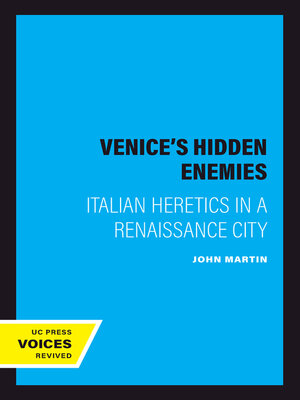Venice's Hidden Enemies
ebook ∣ Italian Heretics in a Renaissance City · Studies on the History of Society and Culture
By John Martin

Sign up to save your library
With an OverDrive account, you can save your favorite libraries for at-a-glance information about availability. Find out more about OverDrive accounts.
Find this title in Libby, the library reading app by OverDrive.



Search for a digital library with this title
Title found at these libraries:
| Library Name | Distance |
|---|---|
| Loading... |
How could early modern Venice, a city renowned for its political freedom and social harmony, also have become a center of religious dissent and inquisitorial repression? To answer this question, John Martin develops an innovative approach that deftly connects social and cultural history. The result is a profoundly important contribution to Renaissance and Reformation studies.
Martin offers a vivid re-creation of the social and cultural worlds of the Venetian heretics—those men and women who articulated their hopes for religious and political reform and whose ideologies ranged from evangelical to anabaptist and even millenarian positions. In exploring the connections between religious beliefs and social experience, he weaves a rich tapestry of Renaissance urban life that is sure to intrigue all those involved in anthropological, religious, and historical studies—students and scholars alike.
How could early modern Venice, a city renowned for its political freedom and social harmony, also have become a center of religious dissent and inquisitorial repression? To answer this question, John Martin develops an innovative approach that deftly conn
Martin offers a vivid re-creation of the social and cultural worlds of the Venetian heretics—those men and women who articulated their hopes for religious and political reform and whose ideologies ranged from evangelical to anabaptist and even millenarian positions. In exploring the connections between religious beliefs and social experience, he weaves a rich tapestry of Renaissance urban life that is sure to intrigue all those involved in anthropological, religious, and historical studies—students and scholars alike.
How could early modern Venice, a city renowned for its political freedom and social harmony, also have become a center of religious dissent and inquisitorial repression? To answer this question, John Martin develops an innovative approach that deftly conn







